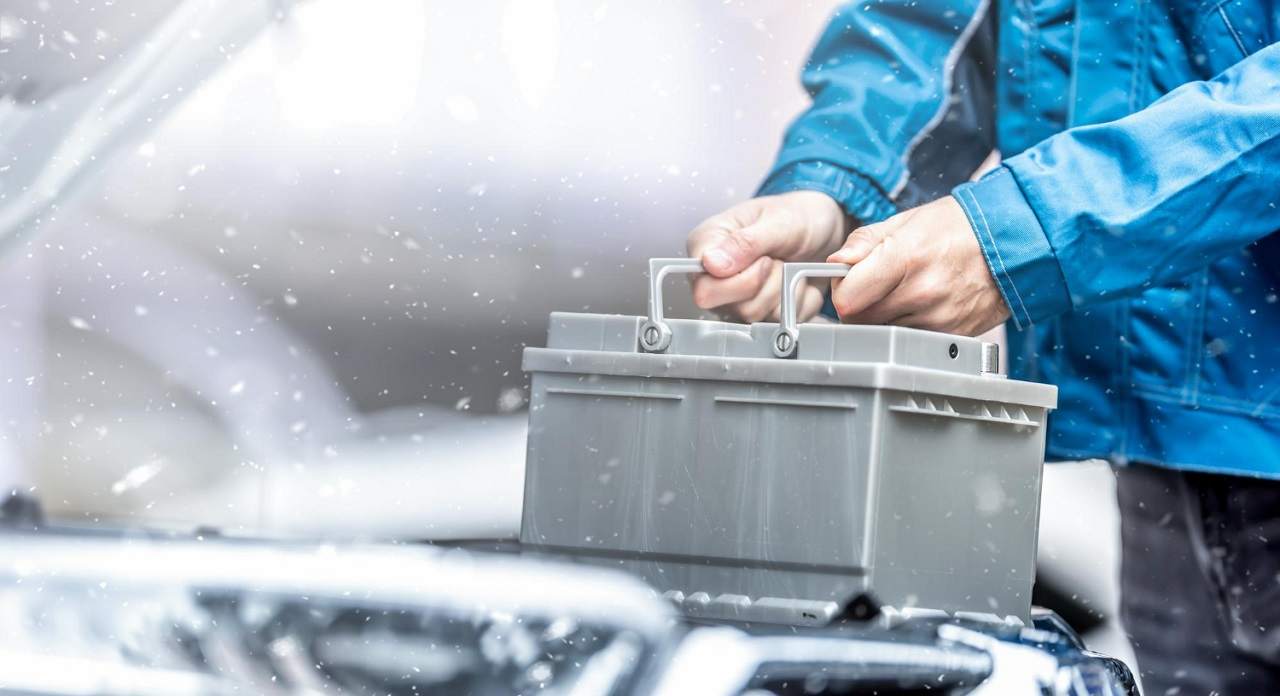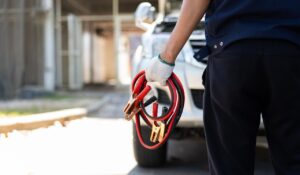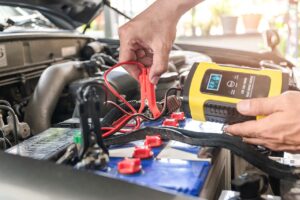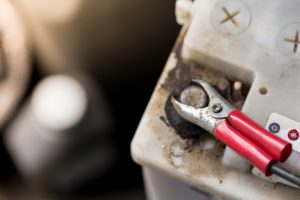When the Minneapolis winter rolls in with its snow-capped boots and frosty breath, it’s not just our fingers and toes that feel the chill—our cars do too. Front and center under the hood is the trusty car battery, which often bears the brunt of Old Man Winter’s antics. The cold can be a real villain when it comes to your battery’s performance, sapping its strength and leaving you with the dreaded silent engine on a freezing morning.
The good news is: with a little know-how and some preventative care, you can keep your battery in fighting form.
Let’s dive into the science behind why your battery might give you the cold shoulder and how you can keep it warm and ready for action.
First, some SCIENCE!
Deep within your car’s engine bay, a box of lead and acid is quietly brewing up a storm of electrons, all to keep your wheels turning.
This nifty little box – your car’s battery – is a mini-powerplant, constantly churning out electrical energy through a lead-acid reaction that’s as reliable as your morning coffee.
Before we get into how to maintain your battery, let’s first jump-start our understanding of the science that make the battery tick.
The Role of Temperature in Chemical Reactions
Temperature plays a big role in chemical reactions, including the electrochemical reactions in a car battery. According to something called the “Arrhenius equation“, a chemical reaction rate increases with temperature due to the increased energy of the molecules involved in the reaction.
Basically, as temperature rises, molecules move faster, collide more often, and as a result react more rapidly.
In cold conditions, the opposite is true. The reaction rates slow down as molecules have less energy and move slower. The result for our trusty car battery is that the chemical reaction that generates electricity proceeds more sluggishly in colder temperatures.
The Effect of Cold on Battery Components
Cold temperatures also affect the physical properties of the battery’s components. The electrolyte solution within the battery, which is essential for the flow of electricity, becomes more viscous in cold weather. This increased viscosity impedes the electrolyte’s flow, further slowing down the electrochemical reactions.
Additionally, the cold can increase the internal resistance of the battery. Higher resistance means that even though the battery can store energy, it’s not as efficient at releasing it. This is why you may have a battery that shows a decent charge but still struggles to turn over the engine in cold weather.
Recognizing the signs that your car battery is nearing the end of its life can save you from the inconvenience of unexpected breakdowns. Here are some common indicators that suggest a battery may need to be replaced:
- Slow Engine Crank: When you attempt to start the vehicle, the cranking of the engine is sluggish and takes longer than normal to start.
- Check Engine Light: The check engine light sometimes appears when your battery power is weak. While this light can indicate a variety of issues, it’s a good idea to have your battery tested if it illuminates.
- Low Battery Fluid Level: Car batteries typically have a part of the casing that’s translucent so you can keep an eye on your battery’s fluid level. If the fluid level is below the lead plates (energy conductor), it’s time to have the battery and charging system tested.
- The Swelling Battery Case: If your battery casing looks swollen or bloated, this is often caused by excessive heat and is a sign that your battery is not operating within normal parameters.
- Battery Leak: Leaking also causes corrosion around the posts where the positive and negative cable connections are located. If the battery terminals (posts) have corrosion, your car may not start or may stall, and you will need to clean the posts to get a strong connection.
- Age: Typically, a car battery life expectancy is about three to five years. If your battery is nearing the end of its lifecycle, watch for signs of weakness and consider replacing it before it fails.
- Frequent Jump-Starts: If you need to jump your car frequently to get it started, it’s a clear sign that your battery is failing.
- Electrical Component Issues: If you notice the lights dimming or electrical components working erratically, it could be a sign that the battery is struggling to maintain charge.
- Strange Smell: A damaged battery may emit a sulfur smell (like rotten eggs) when it leaks. If you notice this odor, it’s important to have your battery checked out.
- Inconsistent Starting: Experiencing intermittent starting troubles can be a sign of a failing battery. Sometimes your car may start fine, and other times it may struggle or fail to start; this inconsistency can often be attributed to battery issues.
If you notice any of these signs, it’s wise to have your battery tested at an auto parts store or by a professional mechanic. It’s always better to address battery issues before they lead to a no-start situation, especially during the winter months when the cold can exacerbate a weak battery’s problems.
As a roadside assistance service in Minneapolis, wintertime is prime season for car breakdowns. Here’s the most common…
Tips for Maintaining Your Car Battery in Winter
Batteries don’t last forever, but you can maximize the longevity this important car component by keeping up with common-sense, totally-doable maintenance habits like those below…
- Regular Charging: To counteract the natural discharge that all batteries experience, keep yours topped up. If you’re not driving often or only going on short trips, a portable charger or maintainer can keep your battery at full capacity.
- Frequent Driving: Batteries recharge while driving, so regular use is beneficial. Try to take your car out for longer drives to give the battery a good charge.
- Voltage Checks: A simple voltmeter can tell you a lot about your battery’s health. A reading of 12.6 volts or higher when the car is off indicates a full charge. A reading below 12.4 volts suggests it’s time for a recharge.
- Clean Connections: Inspect the battery terminals and clean off any corrosion with a mixture of baking soda and water. This ensures the best possible connection between your battery and the vehicle’s electrical system.
- Secure Connections: Loose battery terminals can cause electrical issues. Make sure the connections are tight and secure.
- Professional Battery Test: An annual test by a professional can assess the battery’s ability to hold a charge. Most auto service shops offer this service.
- Insulation and Warmth: Battery blankets and engine heaters are excellent tools for keeping your battery warm, which is especially helpful for vehicles parked outside.
- Garage Parking: If available, park your vehicle in a garage to shield it from the coldest temperatures.
- Conserving Power: On your first start of the day, keep the electrical load light. Turn off heaters, radios, and other accessories until after the engine is running.
- Charging System Check: Have your vehicle’s charging system checked to ensure the alternator is properly charging the battery.
- Battery Insulation: Battery insulation kits can help maintain a stable temperature around the battery.
- Proactive Replacement: Consider the age of your battery. If it’s nearing the three-year mark, it might be wise to replace it before winter starts.
By adhering to these maintenance tips, you can significantly decrease the likelihood of battery-related issues during the winter.
Timber Towing & Recovery: Your Winter Vehicle Support
Despite the best preparations, sometimes batteries fail. This is where Timber Towing & Recovery steps in. Our team is ready to assist with a jump-start or tow if your battery lets you down. With our help, a dead battery doesn’t have to mean a dead end to your day.
Remember that the key to winter reliability is regular maintenance. By taking proactive steps to care for your battery, you can ensure your vehicle remains as ready for adventure as you are, no matter the temperature outside. And when the unforeseen happens, you can rely on Timber Towing & Recovery to get you back on the road swiftly and safely. Keep our number handy for any winter emergencies: (651) 318-0441.




